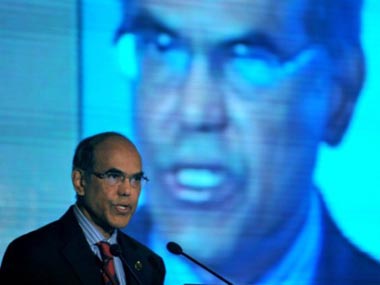In an exclusive interview to The Wall Street Journal, Reserve Bank of India governor D Subbarao increased his criticism of government spending and said that without a credible plan to rein in the fiscal deficit, the task of keeping inflation under control would remain a tough challenge.
In the interview, he offered a road-map on how to cut the fiscal deficit – the gap between government revenues and expenditure.The fiscal deficit was originally estimated at 4.6 percent for the financial year ending March 2012, but it’s almost certain that it will end the year closer to 5.5 percent.
[caption id=“attachment_213029” align=“alignleft” width=“380” caption=“He suggested that in addition to offering a fiscal deficit estimate for the next year. AFP”]  [/caption]
Subbarao offered a simple plan for bringing the government’s finances back into shape. He suggested that in addition to offering a fiscal deficit estimate for the next year, Finance Minister Pranab Mukherjee should also prepare a medium-term roadmap to cut the fiscal deficit. “I think he should back that up with a credible plan of how it’s going to be achieved,” he told the newspaper.
Next step, the government needed to cut expenditure in addition to increasing taxes.
Finally, he urged the government to pay attention to the quality of fiscal adjustment, because as the governor rightly noted, “…if you are chasing just the number, it’s possible that you would prune out productive expenditure and retain unproductive expenditure.”
On the subject of cutting expenditures, he said one way was to cut subsidies, which, he thought, needed to be more focused on helping the poor. "…I believe there is quite a strong case for making adjustments on subsidies even from the anti-poverty perspective," he said.
So what subsidies can be done away with, according to the governor? Those on LPG (domestic cooking fuel), for one. “If there is subsidy in LPG (liquefied petroleum gas), it’s a subsidy that’s not going to the poor. It’s a subsidy that’s going to people who can afford LPG, which is certainly not the poor,” he told WSJ.
Power subsidies could also do with some major corrections, he added. “Power subsidies are given by state governments according to people who have land, whereas the landless, who are poorer, don’t get any subsidy at all. There’s got to be some attention paid to the poverty impact of subsidies and targeting subsidies with an anti-poverty focus.”
Of course, in an election year, it’s hard to really cut subsidies. Indeed, as the WSJ interviewers noted, all the political parties in Uttar Pradesh are campaigning to give away free power, which would make it hard to cut spending in the next year.
Subbarao acknowledged that. “Sometimes there is concern of how much of a democracy tax we are paying,” he told the newspaper.
You can read the interview transcript here.


)
)
)
)
)
)
)
)
)



